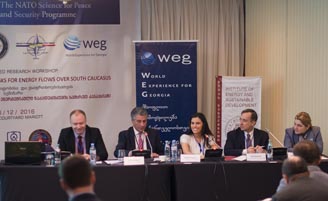Emerging security risks for energy flows across South Caucasus
Energy security is high on the political agendas of both NATO member states and partner countries. At the NATO Summit in Warsaw in July 2016, Allied leaders highlighted that energy developments can have significant political and security implications. Stable and reliable energy supplies, the diversification of import routes, suppliers and energy resources, and the interconnectivity of energy networks are of critical importance and increase resilience against political and economic pressure.

To address these issues and provide a thorough review of the main emerging security risks to critical energy infrastructure, a NATO-sponsored Advanced Research Workshop “Addressing Emerging Security Risks for Energy Flows over South Caucasus” was organised in Tbilisi, Georgia, on 5 and 6 December 2016.
The workshop consisted of six major panels along with a field trip to the Military Scientific Technical Center DELTA premises in Tbilisi. The panels addressed a number of issues, emphasising the importance of the energy transit function of Georgia and the South Caucasus and reviewing existing and future energy transit projects including the Southern Gas Corridor as well as other potential flows of oil, gas and power.
Areas of common interest and forms of cooperation between consumers (European Union, Turkey), producers (Azerbaijan, Turkmenistan) and transit countries (Azerbaijan, Georgia, Turkey) were debated. Discussions also focused on new security challenges and potential threats to new strategic energy transit projects in the region, including terrorism, potential military actions or political instability. Recent trends in technology, which have both the potential to protect or damage critical energy infrastructure, and readiness of the countries to respond were also reviewed.
The wider context

“Enhancing our network with all of you here today is fundamental to our effective and coordinated approach to security in today’s globalised world,” said Michael Gaul, Senior Advisor in NATO’s Emerging Security Challenges Division.
Deputy Minister of Energy of Georgia Mariam Valishvili underscored, “the oil and gas pipelines, set through the strong Western support including the US, European and other NATO member countries, have played a significant role in preserving the political independence and economic development of the countries in the region by keeping them linked to the international markets and in the focus of international western interests.”
The Commandant of the General Jonas Žemaitis Military Academy of Lithuania, Col Raimundas Matulis, stressed the need to look carefully at the lessons learnt in the Baltic States and to share experience in crafting credible energy security policy tools.
The co-director of the project, Murman Margvelashvili, noted, “assuring the security of existing and potential energy flows over Southern gas corridor has been identified as one of the strategic interests for European energy security but it is also a major factor of security for the supplier and transit countries in the region.”
International participation
The workshop was organised by Lithuania’s General Jonas Žemaitis Military Academy and Georgia’s Ilia State University with the support of the NATO Science for Peace and Security Programme. Valuable assistance was provided by the Romanian Embassy in Tbilisi as the NATO Contact Point Embassy and by the independent think-tank ‘World Experience for Georgia’.
The event was attended by representatives of NATO, the US State Department, the Georgian ministries of energy and foreign affairs, NATO’s Energy Security Centre of Excellence, NATO Liaison Office in Tbilisi, Vytautas Magnus University (Lithuania), Nazarbayev University (Kazakhstan), the Graduate Institute of International and Development Studies (Geneva), the Center of Strategic Studies under President of Azerbaijan, the Data Exchange Agency (Georgia), the Centre for Global Studies “Strategy XXI” (Ukraine), the Center for Study of Democracy (Bulgaria), Baku State University (Azerbaijan), the Energy Charter, Jan Wyzykowski University (Poland), Stratfor, Methinks Ltd and European Geopolitical Forum.
The participants identified the potential forms of cooperation for security, between the countries of the region and NATO at different levels to provide adequate strategic and tactical safeguards against emerging threats. The results of the workshop will be published and will provide a set of recommendations for decision makers and analysts.
